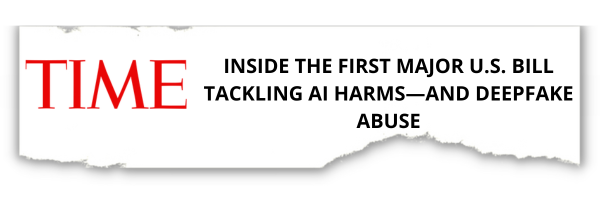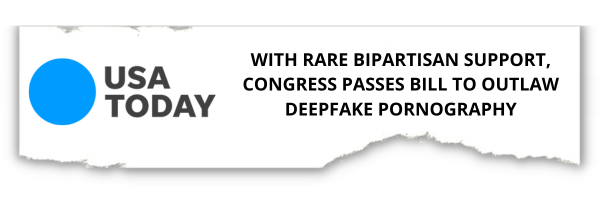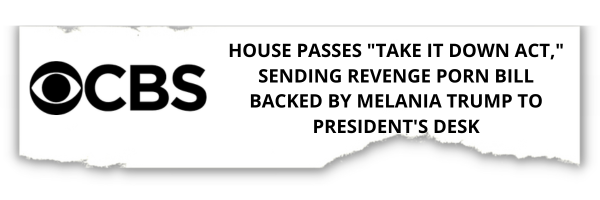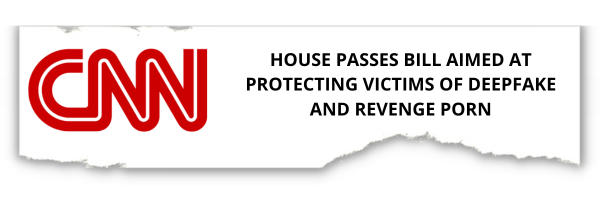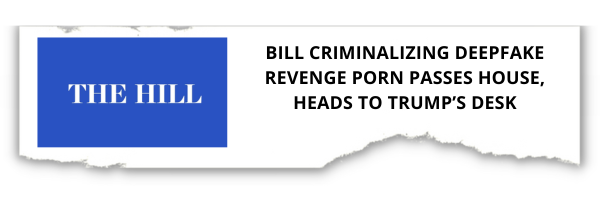WTAS: Bipartisan, Bicameral TAKE IT DOWN Act to Criminalize the Spread of Deepfake Revenge Porn Heads to President Trump’s Desk
Washington, D.C. – Yesterday, the bipartisan, bicameral TAKE IT DOWN Act, introduced in the Senate by Commerce Committee Chairman Ted Cruz (R-Texas) and co-led by Sen. Amy Klobuchar (D-Minn.), passed the U.S. House of Representatives by a vote of 409-2 and heads to President Trump’s desk. The legislation unanimously passed the Senate in February.
The TAKE IT DOWN Act criminalizes the publication of non-consensual intimate imagery (NCII), including AI-generated NCII (or “deepfake revenge pornography”), and requires social media and similar websites to implement procedures to remove such content within 48 hours of notice from a victim.
The House companion was introduced by Reps. Maria Elvira Salazar (R-Fla.) and Madeleine Dean (D-Pa.).
Here is what they are saying about the TAKE IT DOWN Act:
TIME: Inside the First Major U.S. Bill Tackling AI Harms—and Deepfake Abuse
“In January, however, Cruz was promoted to become the chair of the Senate Commerce Committee, giving him a major position of power to set agendas. His office rallied the support for Take it Down from a slew of different public interest groups. They also helped persuade tech companies to support the bill, which worked: Snapchat and Meta got behind it.
“‘Cruz put an unbelievable amount of muscle into this bill,’ says Sunny Gandhi, vice president of political affairs at Encode, an AI-focused advocacy group that supported the bill. ‘They spent a lot of effort wrangling a lot of the companies to make sure that they wouldn't be opposed, and getting leadership interested.’”
THE DALLAS MORNING NEWS: House passes Ted Cruz bill cracking down on deepfake nudes
“U.S. Sen. Ted Cruz’s bill targeting the publication of nonconsensual deepfake pornography will soon be federal law.
“The House voted 409-2 Monday to approve the bill, which already passed the Senate, sending it to President Donald Trump’s desk.
“Elliston was 14 years old in October 2023 when a classmate used an artificial intelligence program to turn innocent photos of her and her friends into realistic-looking nudes and distributed the images on social media.
“They were only removed after they shared the story with Cruz and he pushed for action.
“First lady Melania Trump participated in an event highlighting the issue and Elliston sat with her as a guest for the president’s joint address to Congress.
“Trump gave Elliston a shout-out during the speech, saying he looked forward to signing Cruz’s proposal into law after the House passed it.”
USA TODAY: With rare bipartisan support, Congress passes bill to outlaw deepfake pornography
“A bill to criminalize AI-generated explicit images, or ‘deepfakes,’ is headed to President Donald Trump’s desk after sailing through both chambers of Congress with near-unanimous approval.
“The Take It Down Act has enjoyed uncommon bipartisan support, along with a key endorsement from the first lady.
“The newly-passed bill will require technology platforms to remove reported “non-consensual, sexually exploitative images” within 48 hours of receiving a valid request. Sens. Ted Cruz, R-Texas, and Amy Klobuchar, D-Minnesota, introduced the legislation in August.”
The New York Times: House Passes Bill to Ban Sharing of Revenge Porn, Sending It to Trump
“The legislation, introduced by Senators Ted Cruz, Republican of Texas, and Amy Klobuchar, Democrat of Minnesota, is the first internet content law to clear Congress since 2018, when lawmakers approved legislation to fight online sex trafficking. And though it focuses on revenge porn and deepfakes, the bill is seen as an important step toward regulating internet companies that have for decades escaped government scrutiny.”
CBS NEWS: House passes "Take it Down Act," sending revenge porn bill backed by Melania Trump to president's desk
“‘If you're a victim of revenge porn or AI-generated explicit imagery, your life changes forever,’ Sen. Ted Cruz, a Texas Republican, said at a March 3 roundtable promoting the bill.
“Cruz, who introduced the bill, recalled the experience of a teenage victim, Elliston Berry, whose classmate used an app to create explicit images of her and then sent them to her classmates. Berry's mother had tried unsuccessfully to get Snapchat to remove the images for months before she contacted Cruz's office for help.
“‘It should not take a sitting senator or sitting member of Congress picking up the phone to get a picture down or video down,’ Cruz said.”
CNN: House passes bill aimed at protecting victims of deepfake and revenge porn
“Republican Sen. Ted Cruz of Texas introduced the bill, and a bipartisan group of lawmakers, including Democratic Sen. Amy Klobuchar of Minnesota and Rep. Madeleine Dean of Pennsylvania, have supported the effort.
“According to Cruz’s office, the bill ‘would criminalize the publication of non-consensual intimate imagery (NCII), including AI-generated NCII (or ‘deepfake pornography’), and require social media and similar websites to have in place procedures to remove such content upon notification from a victim.’”
THE HILL: Bill criminalizing deepfake revenge porn passes House, heads to Trump’s desk
“Cruz celebrated the bill’s passage on Monday, calling it a ‘historic win in the fight to protect victims of revenge porn and deepfake abuse.’
“‘By requiring social media companies to take down this abusive content quickly, we are sparing victims from repeated trauma and holding predators accountable,’ he wrote in a statement.”
More than 120 organizations representing victim advocacy groups, law enforcement, and tech industry leaders have voiced their support for the legislation, including Meta, Snap, Google, Microsoft, TikTok, X, Amazon, Bumble, Match Group, Entertainment Software Association, IBM, TechNet, the U.S. Chamber of Commerce, Internet Works, the Fraternal Order of Police, the National Center for Missing and Exploited Children (NCMEC), RAINN (Rape, Abuse, & Incest National Network), and the National Center on Sexual Exploitation (NCOSE).
In March, Sen. Cruz and Rep. Salazar hosted a bipartisan roundtable with First Lady Melania Trump to hear from victims of revenge and deepfake pornography and urge the House to pass the bipartisan TAKE IT DOWN Act. During his State of the Union address, President Trump emphasized the bill’s importance and said, “I look forward to signing it into law.”
Other notable endorsements came from the bipartisan Problem Solvers Caucus, a group of House lawmakers evenly split between Republicans and Democrats, and Paris Hilton, who called the bill “a crucial step toward ending non-consensual image sharing online.”
During the 118th Congress, the bill unanimously passed the Senate Commerce Committee and the full Senate.
BACKGROUND:
While nearly every state has a law protecting people from non-consensual intimate imagery (NCII), including 30 states with laws explicitly covering sexual deepfakes, these state laws vary in classification of crime and penalty and have uneven criminal prosecution. Further, victims struggle to have images depicting them removed from websites, increasing the likelihood the images are continuously spread and victims are retraumatized.
In 2022, Congress passed legislation creating a civil cause of action for victims to sue individuals responsible for publishing NCII. However, bringing a civil action can be incredibly impractical. It is time-consuming, expensive, and may force victims to relive trauma. Further exacerbating the problem, it is not always clear who is responsible for publishing the NCII.
The TAKE IT DOWN Act would protect and empower victims of real and deepfake NCII while respecting speech by:
- Criminalizing the publication of NCII in interstate commerce. The bill makes it unlawful for a person to knowingly publish NCII on social media and other online platforms. NCII is defined to include realistic, computer-generated pornographic images and videos that depict identifiable, real people. The bill also clarifies that a victim consenting to the creation of an authentic image does not mean that the victim has consented to its publication.
- Protecting good faith efforts to assist victims. The bill permits the good faith disclosure of NCII, such as to law enforcement.
- Requiring websites to take down NCII upon notice from the victim. Social media and other websites would be required to have in place procedures to remove NCII, pursuant to a valid request from a victim, within 48 hours. Websites must also make reasonable efforts to remove copies of the images. The Federal Trade Commission is charged with enforcement of this section.
- Protecting lawful speech. The bill is narrowly tailored to criminalize knowingly publishing NCII without chilling lawful speech. The bill conforms to current First Amendment jurisprudence by requiring that computer-generated NCII meet a “reasonable person” test for appearing indistinguishable from an authentic image.
To read the bill text, click HERE.
###

